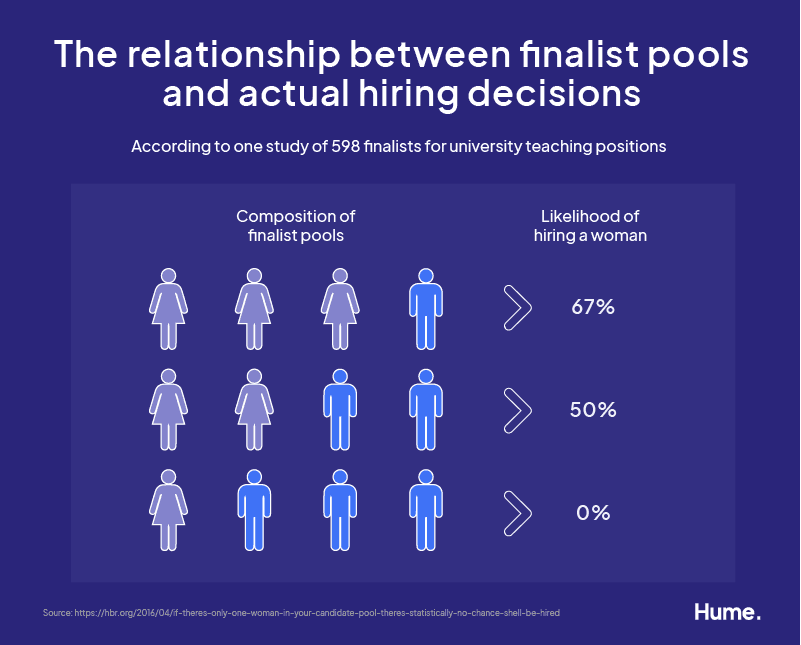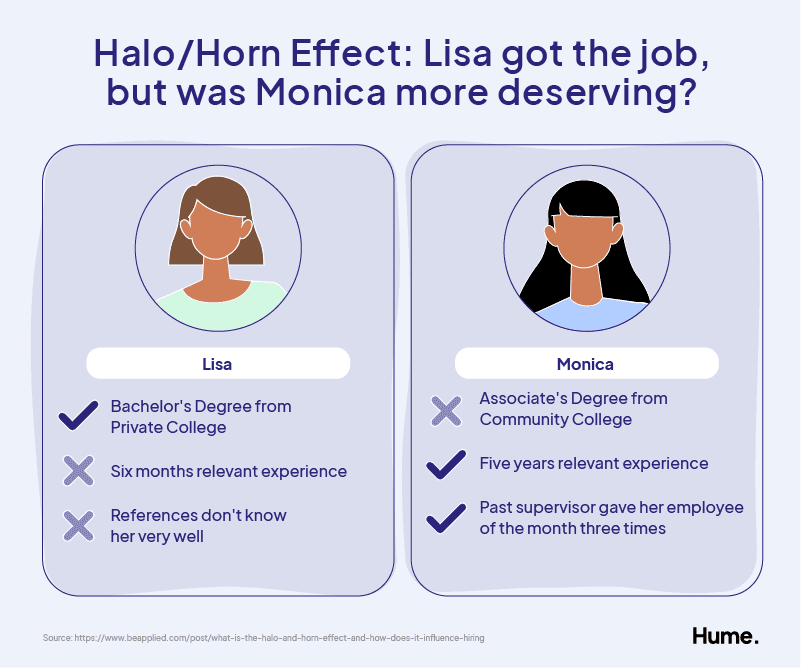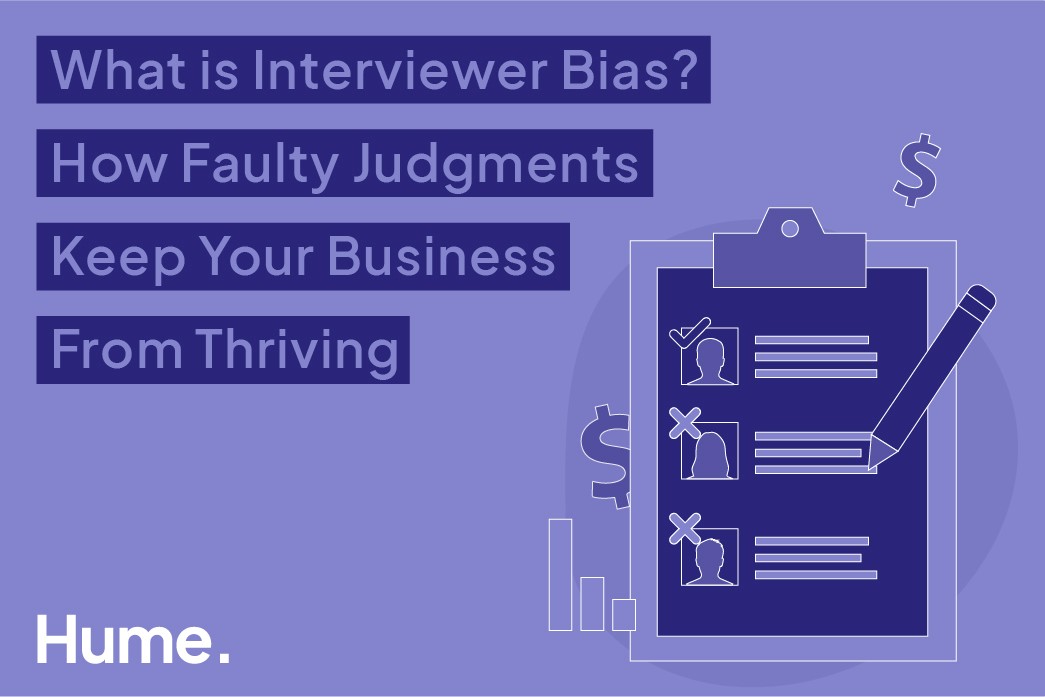What is Interviewer Bias? How Faulty Judgments Keep Your Business From Thriving
Snap judgments make unstructured interviews lousy predictors of job performance. So how can you recognize when you're making them? Read up on interviewer bias.
5.0

Add an AI assistant to your interviews
Start with 5 interviews for free
Already have an account?
Log in
Job interviews need to be level playing fields to ensure top-notch quality of hire.
But even the most reputable interviewers can judge candidates on unspoken, irrelevant, and unfair criteria — all without them even noticing.
Think about how easy it is to give someone mental brownie points for growing up in your same hometown. Or laughing at your joke.
What about when you meet someone who struggles sustaining eye contact — are you likely to assume they're disinterested? Or maybe even too nervous to be a good employee?
These mental shortcuts are the human brain's way of assessing complex problems and making decisions under duress. Hirers aren't immune to them. But are such surface-level judgments good predictors of job performance?
Absolutely not.
So let's talk about interview bias — what it is, how it muddies the hiring process, and how you can spot it before it's too late.
What is interviewer bias?
Interviewer bias is a term for the hasty, often faulty judgments made when assessing a candidate in a job interview.
It happens when a hiring manager, candidate recruiter, or anyone else conducting the interview judges someone on distorted, unspoken criteria based on either party's upbringing, background, or disposition.
This same term is often used in research and academia, when questions are phrased in ways that affect survey results (intentionally or not). But in the hiring world, interviewer bias is when those same snap judgments are made toward candidates.
This can take the form of overt, conscious stereotyping. But it can be more subtle and implicit. Either way, it makes hiring less of a meritocracy. It's also a huge drain on productivity, leading to high turnover and low workplace diversity.
Learn everything you need to know about interview bias from our comprehensive guide, here.
Can interviewer bias lead to bad hires?
Bias ripples through the seams of unstructured interviews. In fact, it can result in you overlooking the best candidate for the role. When you're chit chatting with an interviewee as if it were a normal, free-flowing conversation, you're pressing for details you may find relevant personally, but are often meaningless professionally.
For this reason, unstructured interviews predict just 14% of a hire's performance. And according to some research, nearly 70% of companies identified a broken interview process as the biggest drag on hiring.
Even so, many recruiters still think these types of interviews work. According to some research of salespeople, unstructured interviews had an even weaker correlation to good job performance than aptitude and personality tests (which were still both pretty weak). This all despite HR professionals' perception that these interviews were good barometers.
For the numbers on the right-hand side graphic (above), keep in mind that anything below .5 signals a weak correlation, and anything below .3 is negligible.
The verdict? Unstructured interviews are unhelpful.
7 scary facts about bias in hiring
According to a LinkedIn Global Recruiting Trends report, 42% of HR professionals said bias is the main reason why traditional interviews fail at finding the best candidate.
One study in the British Psychological Society found that 60% of interviewers decide whether they think a candidate is suitable for the role within 15 minutes.
Research from two University of Pennsylvania professors found that a prestigious internship boosted a white man's resume rating 50% more than the same internship for a woman or minority candidate.
In 2017, a National Bureau of Economic research study reviewed 40,000 applications and found "robust evidence of age discrimination in hiring against older women, especially those near retirement age."
In a 2012 survey of 268 corporate leaders, 35% said “good grooming,” made women showcase more of an “executive presence.” And 16% said “physical attractiveness” played a role. Those same snap judgments factored in for men, too — at 38% and 14%, respectively.
According to a Yale study, interviewers will judge a candidate's social status based on their speech patterns — all within seconds of them speaking.
According to one study, when there was only one woman or minority candidate in a pool of four finalists for a teaching position, their chances of getting hired was statistically zero.

10 types of interviewer bias
Interview bias can have disastrous effects on the hiring process. But how can you diagnose it? The Society of Human Resources Management identified 10 common biases to avoid.
Stereotyping
What it is: When interviewers make generalized opinions based on an identity or group a candidate belongs to, whether it's their ethnicity, gender, socioeconomic background, or something else.
How it impacts interviews: Stereotyping bias is hollow. It may cause you to think a man is a better-suited investment banker, or that a woman is more cut out for a teaching position. But this bias overlooks more substantive qualifications.
Inconsistency in questioning
What it is: When interviewers ask different kinds of questions to each of its candidates.
How it impacts interviews: Inconsistent questions make for unstructured candidate interviews, because there's no centralized rubric to fairly judge skills. Say you ask Candidate A, who ran a tech startup that didn't pan out, what the worst mistake she made on an important job was. Then you judge her (positively or negatively) for her response.
Shouldn't Candidate B have the chance to answer the same question? Interviewers may think: eh, I don't need to ask him that. He was a Google Executive. But that's biased reasoning.
First impression bias
What it is: Forming an instant judgment or assumption about someone, and "trusting your gut" about that initial judgment throughout the hiring process.
How it impacts interviews: First impressions are often wrong. But they're also inevitable. Our brains need a way of processing all the decisions we have to make in a limited time. This can cause quick-trigger, faulty judgments that are hard to diverge from — even after being presented with new information.
Unstructured interviews are hotbeds for this kind of harebrained decision-making. For instance, maybe a candidate dresses casually for an interview and is assumed to not take themselves too seriously. The interviewer may latch onto that faulty assumption even after they go into painstaking detail about how much they value their work.
Halo effect
What it is: Assuming being good at one thing equates to being good at multiple things.
How it impacts interviews: You may overlook a candidate's deficiencies in favor of one sparkly attribute, even when it's irrelevant to the job. You see this a lot with education. According to an Indeed study, hiring managers often show bias toward candidates who graduated from top colleges, even when such credentials have nothing to do with the competencies required for on-the-job success (things like strategic thinking, teamwork, and self-direction).
Horn effect
What it is: The opposite of the halo effect — a.k.a the (wrong!) assumption that one weakness equals many weaknesses.
How it impacts interviews: When you extrapolate one lackluster quality to an entire job application, you can overlook some excellent credentials. Take our example of the halo and horn effect below. Monica's probably the better candidate. But an interview may be primed to prefer Lisa because the first thing on a resume "looks" better — even though where you went to school often doesn't matter.

Cultural noise
What it is: When interviewers believe candidates who give the "right" answer instead of the "honest" one.
How it impacts interviews: Candidates aim to impress — even when it means obscuring reality. For instance, someone may say they're comfortable managing fast-twitch deadlines, even when history suggests they like taking their time, and want their obligations spread out.
Nonverbal bias
What it is: Judging body language or putting undue emphasis on other non-spoken behavior.
How it impacts interviews: Recruiters often stress the importance of eye contact. It signals you're a good listener, shows respect, and projects confidence. But should it be the end-all-be-all of whether a candidate earns a job offer? Probably not... Especially if the job requires little face to face contact.
Contrast effect
What it is: Using previous candidates to hastily determine whether you like the current one.
How it impacts interviews: You've heard the expression "tough act to follow." In unstructured interviews, a strong candidate could be at a disadvantage going immediately after an even stronger candidate. Similarly, a not-so-great candidate can look better going after a few consecutive weak candidates.
Similar-to-me
What it is: When hirers (either consciously or unconsciously) prefer candidates they have traits in common with.
How it impacts interviews: It's human to gravitate toward familiarity. According to research, bankers, lawyers, and consultants all favored people like themselves in job interviews. And, borrowing again from that Indeed study, 37% of hiring managers who went to top schools only like to hire from top schools, compared to just 6% of other managers.
Consciously or not, hirers can favor candidates they share things in common with. When a sociologist surveyed bankers, lawyers, and consultants, they all claimed they gravitated towards people like themselves in interviews.
This is also called affinity bias. If left unchecked in a job interview, it can easily seep into hiring.
Central tendency
What it is: Rating every candidate as average.
How it impacts interviews: You want to hold out for quality hires — but only to a point. If you're judging everyone on too high a standard, you could weed out unconventional candidates who may make for great hires.
De-biasing your interview process
As you can see, unstructured interviews are fraught with snap judgments. Even the best-intentioned recruiters are vulnerable to unconscious bias, which threaten the fairness of the hiring process.
But with all the ways you can go wrong, how do you go about reducing bias and getting the interview process right?
If you want to diminish interview bias, you need a system of checks and balances that ensures objectivity. Things like:
Asking different candidates the same interview questions.
Judging all your candidates on a standardized rubric.
Letting a panel of colleagues weigh in on your hiring decisions.
Collecting comprehensive data on every candidate, to ensure important information isn't clouded by your initial impressions.
It's a lot of work to de-bias your entire interview process from scratch. But you don't have to do it alone.
There's always Hume, a savvy interview companion that helps you dismantle any kind of sneaky judgments lurking in the hiring process.
Our talent intelligence platform transcribes conversations so that you need not worry about taking meticulous interview notes. You can also quickly annotate those transcripts with tags — things like skills, motivations, and red flags — so that no valuable candidate information slips through the cracks.
And these insights are easy to distribute. You can slice up the most critical moments of interviews and create a highlight reel to share with your colleagues. This way, others can weigh in on your interview without breaking a sweat.
Hume also helps interviewers stay on message. You can program in a template to ensure different candidates are asked the same exact questions and compared on a level playing field. You can even use Hume's Playlist feature to make coaching videos to ensure recruiters know how to identify and diminish bias.
Hume gives interview structure. It paves the way toward helping you find the perfect candidate, so you can get that offer letter out in record speed.
To learn more about how Hume thwarts interviewer bias at every turn, join our waiting list. You can also follow our LinkedIn page and tune in for tips on uncovering who to hire and why.
Imagine transforming every interview into a strategic advantage. Dive deep into every conversation, free from the distraction of note-taking. This isn't just wishful thinking – with Aspect, it's how you'll redefine your hiring process.
Beatriz F
People Success Specialist
Absolutely game-changing for busy recruiters!
The summary, the Q&A feature and the ATS integration have boosted my productivity and lowered the context-switching stress, the analytics provided allowed for me and my team to have full visibility over our stats, and Aspect's team couldn't be more helpful, friendly and accessible!
More Content On Talent Acquisition

